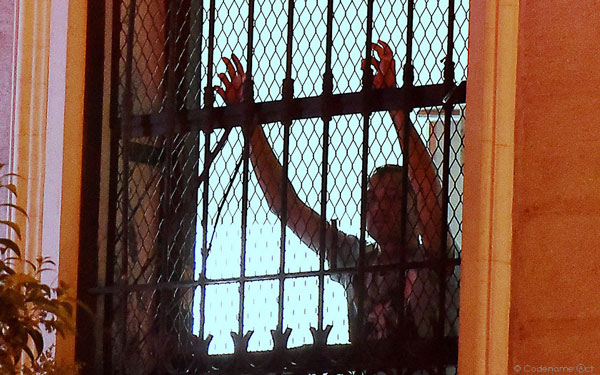 Istanbul is a city of great beauty, great history, and great cultural diversity. It sits on two continents joining the east and the west, literally. Down along the northern coast of the Marmara Sea, just around the bottom of the Golden Horn lays Kumkapi, famous for its fish restaurants, alive at night with the sounds of music, laughter, meals shared, Turkey at its most hospitable; a theater front, hiding in plain sight if one only turns around, the despair of detention. The EU has decided that the best policy for dealing with the refugee, asylum seeker crisis is to put in a policy of deterrence in direct contravention of the UN Charter on Human Rights. The Dublin Regulations are the first brick in the wall of deterrence, keeping refugees at a safe distance. The second brick is to redefine the nature of the crisis; it becomes a crisis of “migration” instead of refugees, allowing for a different handling of those in dire straits. The third brick is repatriation, the return of refugees to the very places they fled, often against their expressed desires. The fourth brick is detention, a pseudonym for incarceration of those who “irregularly” enter or exit a country. The fifth is resettlement, or lack thereof, and the long waits refugees must endure to see if resettlement is in their future.
Istanbul is a city of great beauty, great history, and great cultural diversity. It sits on two continents joining the east and the west, literally. Down along the northern coast of the Marmara Sea, just around the bottom of the Golden Horn lays Kumkapi, famous for its fish restaurants, alive at night with the sounds of music, laughter, meals shared, Turkey at its most hospitable; a theater front, hiding in plain sight if one only turns around, the despair of detention. The EU has decided that the best policy for dealing with the refugee, asylum seeker crisis is to put in a policy of deterrence in direct contravention of the UN Charter on Human Rights. The Dublin Regulations are the first brick in the wall of deterrence, keeping refugees at a safe distance. The second brick is to redefine the nature of the crisis; it becomes a crisis of “migration” instead of refugees, allowing for a different handling of those in dire straits. The third brick is repatriation, the return of refugees to the very places they fled, often against their expressed desires. The fourth brick is detention, a pseudonym for incarceration of those who “irregularly” enter or exit a country. The fifth is resettlement, or lack thereof, and the long waits refugees must endure to see if resettlement is in their future.
Kumkapi Detention Center encompasses several EU bricks of deterrence. Conditions inside Kumkapi, confirmed by detainees, are overcrowded, unsanitary, populations are mixed, asylum seeker with criminal and with young children detained, no outdoor exercise, lights on 24/7, no bedding, insect infested, no access to translators, no access to UNHCR, all done deliberately. These are exactly the conditions described by the UN Special Rapporteur on the human rights of migrants, François Crépeau in his report to the UN General Assembly in April of 2012.[1] Reports from released detainees confirm that Turkey changes nothing; in fact, Turkey escalates the stakes by housing ISIL terrorists next to asylum seekers and fundamentalist Shi’a in hot, overcrowded conditions with no security.
Detainees are purposefully kept from interpreters, thereby allowing the bureaucracy to deny access to UNHCR personnel and the needed documents to apply for asylum. This triggers “repatriation”, the forcible return of asylum seekers to the very situations they fled. Currently, the system is so overwhelmed there are not enough personnel, either through the NGO networks or UNHCR staff, to ensure all asylum seekers are properly documented, especially in a system set up to deny access. On the one hand, EU Court of Human Rights hears more cases on Human Rights infractions in Turkey than any other country except Russia as of 2014. [1] If one looks at the entirety of Turkey’s record with ECHR the picture painted is a very poor one with Turkey’s Human Rights adverse judgements exceeding Russia, and the worst record on Freedom of Expression, as sad state of affairs for a country desiring admission to the European Union, a signatory of the UN Charter of Human Rights and Refugee Convention. On the other hand, the EU spends huge sums of money to keep the system, as it is , in place as part of its policy of deterrence.
All of this happens, (the systematic denial of basic, guaranteed human rights, the incarceration of women and children, the detention of families seeking refuge alongside criminals and terrorists), right around the corner from the famous fish restaurants and night life of Kumkapi.
- Report of the Special Rapporteur on the human rights of migrants, François Crépeau “http://www.refworld.org/docid/502e0bb62.html“
- European court of human rights, Violations by Article and by State – 2014 “http://www.echr.coe.int/Documents/Stats_violation_2014_ENG.pdf“

